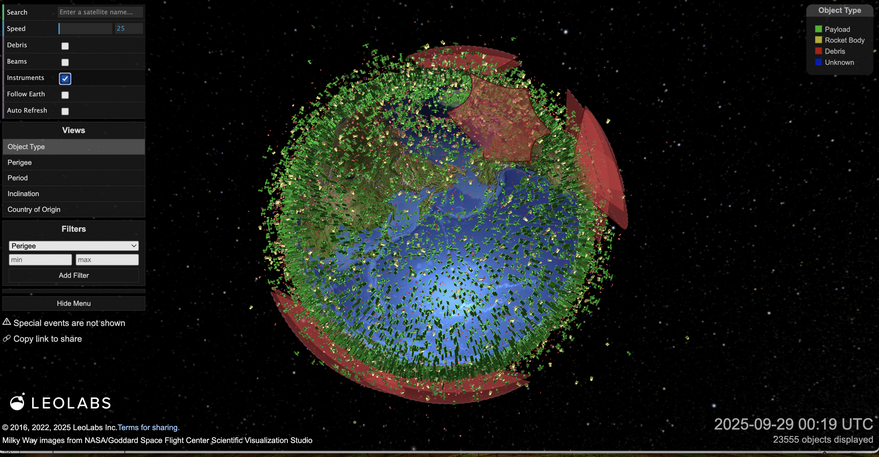Science
Geovis Insighter Technology to Launch 144 Satellites for SSA

A Chinese company, Geovis Insighter Technology Co. Ltd., is set to establish a constellation of 144 space situational awareness (SSA) satellites in low-Earth orbit. Two experimental satellites are scheduled for launch in April 2024, with plans to deploy an additional 12 SSA satellites by the end of 2026. This announcement was made by Dan Luo, executive vice president of Geovis Insighter, during the International Astronautical Congress in Sydney, Australia.
The initial satellites will operate at an altitude of 1,200 kilometers, focusing on monitoring space objects orbiting between 300 and 2,000 kilometers. Furthermore, additional SSA satellites will be positioned in very low Earth orbit (VLEO). Luo acknowledged that while operating satellites in VLEO presents challenges due to increased fuel costs, it allows for the observation of objects at significantly lower orbits.
Geovis Insighter Technology, founded in 2006, went public on the Shanghai Stock Exchange in 2024. Before initiating the development of the new constellation, the company created SSA software for the Chinese government. With this constellation, Geovis aims to provide valuable data to commercial enterprises, enhancing the global space industry’s capabilities.
China’s Comprehensive Approach to Space Traffic Coordination
Luo’s remarks followed a session titled “Policy, Legal, Institutional, Economic and Security Aspects of Debris Mitigation, Debris Remediation and Space Traffic Management” at the congress. During this session, Yuqi Shen, a PhD candidate at the Beijing Institute of Technology and visiting researcher at Leiden University, highlighted China’s comprehensive approach to space traffic coordination (STC). Shen emphasized the importance of communication among satellite operators rather than relying solely on new international treaties.
“We need to increase transparency and information sharing, and we need to improve international interoperability,” Shen stated. He underscored that effective coordination ultimately hinges on trust and the ability of national systems to communicate effectively with one another.
China is actively working on establishing a national space traffic management system, which will provide essential data to international space traffic coordination systems. Shen also pointed out that China has developed expertise in debris removal, as evidenced by the Shijian-21 satellite’s successful towing of the defunct Beidou-2 G2 navigation satellite into a designated graveyard orbit.
Challenges in Space Traffic Coordination
China’s legal framework for space traffic coordination encompasses mission authorization, space-object registration, space-debris mitigation, and radio-frequency management. Despite this progress, there are notable gaps within China’s STC regime, particularly concerning the definition of essential information that operators should share.
Another challenge identified by Shen is the need to assess the intent behind space operations, as similar maneuvers can yield both civil and military interpretations. He stressed the necessity for clear guidelines regarding space traffic data distribution and the establishment of codes of conduct.
As Geovis Insighter Technology prepares for its ambitious satellite launch, the global community will be watching closely. The company’s efforts to enhance space situational awareness could significantly impact commercial space operations and contribute to safer navigation in an increasingly crowded orbital environment.
-

 Science2 weeks ago
Science2 weeks agoNostradamus’ 2026 Predictions: Star Death and Dark Events Loom
-

 Technology1 month ago
Technology1 month agoOpenAI to Implement Age Verification for ChatGPT by December 2025
-

 Technology6 months ago
Technology6 months agoDiscover the Top 10 Calorie Counting Apps of 2025
-

 Health4 months ago
Health4 months agoBella Hadid Shares Health Update After Treatment for Lyme Disease
-

 Health4 months ago
Health4 months agoAnalysts Project Stronger Growth for Apple’s iPhone 17 Lineup
-

 Health4 months ago
Health4 months agoErin Bates Shares Recovery Update Following Sepsis Complications
-

 Technology4 months ago
Technology4 months agoElectric Moto Influencer Surronster Arrested in Tijuana
-

 Technology5 months ago
Technology5 months agoDiscover How to Reverse Image Search Using ChatGPT Effortlessly
-

 Technology6 months ago
Technology6 months agoMeta Initiates $60B AI Data Center Expansion, Starting in Ohio
-

 Technology6 months ago
Technology6 months agoRecovering a Suspended TikTok Account: A Step-by-Step Guide
-

 Education4 months ago
Education4 months agoHarvard Secures Court Victory Over Federal Funding Cuts
-

 Technology2 months ago
Technology2 months agoDiscover 2025’s Top GPUs for Exceptional 4K Gaming Performance





















